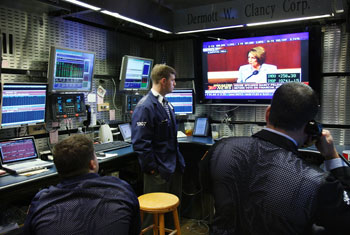NEW YORK - As the US continues to face the threat of an economic meltdown with an impending $700 billion bailout of faltering banks and financial institutions, the cynics are already trumpeting the end of unbridled capitalism and the emergence of socialism in Wall Street.
The celebrations may be premature. Still, there's a new name for the economic shenanigans, cast mostly in black humour: "The People's Republic of Wall Street"-- perhaps in the long-held tradition of mainland China and North Korea.
 |
| New York Stock Exchange (NYSE) traders pause to watch on television the House of Representatives vote on Friday. US President George W. Bush on Friday hailed congressional passage of the Wall Street bailout package, praising it as vital "to helping America's economy weather the financial storm." AFP |
As Europe and the US continue to seek remedies to prop up their failing economic systems, there are some in the non-Western world who blame "Anglo-Saxon" greed for the current crisis. The bonuses, salaries and the "golden parachutes" (for those fired from their high paying jobs) have been astronomical by any standards. The British bank Barclays, which announced a write-down of about $2.8 million last spring, apparently offered a bonus of over $37 million to one of its senior officials last year. And also in 2007, the CEO of Goldman Sachs, Lloyd Blankfein, was paid $68.7 million -- described as "the most ever for a Wall Street CEO."
Carly Fiorina, who was fired as chief executive officer (CEO) of Hewlett Packard (HP) in 2005, received a staggering $21 million as severance pay. She also received an additional $21 million when the company purchased her stock options and pension benefits. She walked away from HP with a golden parachute of $42 million.
Senator John McCain, the Republican candidate running for President, has been publicly critical of these high salaries and bonuses given to CEOs. But in a twist of supreme irony, he has now been called upon to defend Fiorina, one of his closest economic advisers.
"I think she did a good job as CEO in many respects," McCain responded. "I don't know the details of her compensation package. She's one of many advisers I have," he told a reporter. The long prevalent greed in Wall Street, the world's financial capital, was best exemplified in the 1987 Hollywood movie 'Wall Street.'
Oscar-winning actor Michael Douglas, who played the role of a ruthless corporate raider, Gordon Gekko, forsakes all business ethics to climb to the highest echelons of the business world. His speech to a meeting of stock traders is still considered a classic in Wall Street.
"The point is, ladies and gentleman, that greed, for lack of a better word, is good. Greed is right, greed works."
"Greed clarifies, cuts through, and captures the essence of the evolutionary spirit. Greed, in all of its forms; greed for life, for money, for love, knowledge has marked the upward surge of mankind."
But with the turmoil in Wall Street, and the restrictions imposed on high-living lifestyles as part of the US government's bailout package, the philosophy of greed may be coming to an inglorious end.
There were also two major political developments last week -- both related to the financial crisis. The US House of Representatives defeated a bill (228 votes to 205) authorizing the $700 billion bail out package.
As Ted Poe, the Republican from Texas, put it: "Reward people for being irresponsible and expect responsible people to pay for the sins of the financial industry? I don't think so."
But two days later, the US Senate voted in favour of the bill (74 votes to 25) which has undergone far reaching changes, including an increase in the limit on federal insurance for bank deposits, from the current $100,000 to $250,000. As part of the package, and in order to garner support from legislators, the new provision in the bill says that any individual with up to $250,000 in a bank account will find his or her investment safe -- even if the bank declares bankruptcy and closes down. The House of Representatives is expected to take another shot at the revamped bill.
Meanwhile, the countries gloating over the crisis in US capitalism include its critics in Latin America and the Caribbean: Venezuela, Bolivia, Cuba, Ecuador and Argentina.
In recent years, both President Hugo Chavez of Venezuela and Evo Morales of Bolivia, both avowed socialists and anti-American to the core, have lived by the ideology of state intervention and nationalisation.
Urging his Latin American neighbours to break away from the American economic ideology of free enterprise, Chavez said last week: "The world will never be the same after this crisis. A new world has to emerge, and it's a multipolar world."
As part of the conditions laid down for aid to developing nations, the Bush administration has always insisted on imposing its philosophy on the rest of the world: free market economy, sound fiscal policy, good governance, transparency and accountability.
The overpowering US advice is also that there should be no subsidies or bailouts for collapsing financial institutions. The Latin Americans rightly say the US is clearly not practising what it preaches to the outside world. | 
